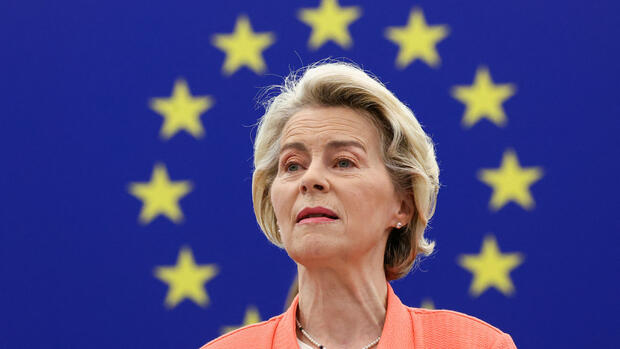Strasbourg The EU wants to take action against cheap Chinese electric cars. She has instructed her authority to start an investigation into market-distorting subsidies, said EU Commission chief Ursula von der Leyen on Wednesday during her speech on the state of Europe in the European Parliament.
The EU is interested in economic exchange with China, but at the same time is determined to defend itself against unfair trade practices. The EU must not allow its companies to be undercut by competitors.
Von der Leyen recalled the fate of the European solar industry, which was forced out of the market ten years ago by heavily subsidized Chinese competitors. This should not happen to the EU again. At the end of the investigation there could be tariffs on imported electric cars, which could offset the Chinese subsidies.
“Global markets are now flooded with cheaper Chinese electric cars,” said the Commission chief. “And their price is kept artificially low by huge government subsidies. This distorts our market.” Europe is open to competition, but not to a “race to the bottom”.
In recent days, the French government in particular has urged the Commission to use new trade instruments to protect the European car industry.
German manufacturers fear trade war
Germany, whose car manufacturers are particularly challenged by growing Chinese competition, is more cautious: companies like BMW, Mercedes and VW are heavily dependent on the Chinese market and fear a trade war.
The European automobile association ACEA praised the Commission’s actions. The announcement sends a “positive signal” that the EU is “addressing the distortions of competition in our sector,” said Sigrid de Vries, director general of the ACEA. The German industry association VDA, however, warned: “Possible counter-reactions from China must also be taken into account.”
The Chinese government supported the development of the industry with around 57 billion dollars between 2016 and 2022, estimates the US consulting company Alix. With this, Beijing wants to achieve what has never been achieved with combustion engines: turn domestic manufacturers into world market leaders.
Around 60 percent of all electric vehicles worldwide now come from Chinese car manufacturers. According to industry figures, around six million so-called New Energy Vehicles (NEVs), i.e. vehicles with electric or hybrid drives, were produced in the People’s Republic last year.
>> Read here: The West is going on the offensive against China
The high level of government funding has also ensured that hundreds of new providers have come onto the market to take advantage of subsidies. This has created enormous excess capacity. Beijing has been trying to combat this since 2017.
The state now supports the industry primarily in the form of tax breaks for consumers when buying electric cars. However, these apply to all makes. The original plan was to allow the tax advantage to expire. However, due to China’s growing economic problems as a result of the Corona restrictions, it was recently extended.
Competition in the world’s largest car market has therefore become even more intense. Many of the Chinese electric car manufacturers are not yet profitable or only achieve very low margins.
At the end of last year, Tesla initiated a price competition that further increased the pressure. The US car manufacturer is very successful in China.
Tough competition: China’s car manufacturers rely on exports
Due to tough competition in the domestic market, China’s electric car manufacturers are increasingly relying on exports – recently also to Europe. This was most recently visible at the IAA motor show in Munich, where numerous Chinese car manufacturers presented themselves.
The IAA has without question shown that China’s car manufacturers are “on the way to Europe,” emphasizes Tu Le, founder of the consulting firm Sino Auto Insights. The number of companies represented and the presence of their managing directors show “that they see an enormous opportunity for growth here”.
According to the China Passenger Car Association (CPCA), more than 350,000 electric vehicles were exported to nine European countries in the first half of the year, more than in the entire previous year. However, almost 40 percent of exports were models from the US car manufacturer Tesla, which produces in China.
>> Read here: The underestimated attackers – which strategies China’s electric car manufacturers are using to shake up the market
It is completely unclear when and how the government will react to the announcement from Brussels. Due to the special importance of the auto industry for the Chinese government, an answer is definitely expected in Brussels. Rule of law processes do not restrict the government in Beijing from taking retaliatory measures. European companies have virtually no rights in the People’s Republic’s authoritarian system, say EU diplomats.
In principle, however, the Europeans benefit from the fact that the Chinese leadership fears nothing more than an alliance between the USA and the EU. China is therefore not interested in a trade war with the Europeans.
Von der Leyen emphasized that it was essential to maintain dialogue with China. There are other issues on which we need to work together. At a planned EU-China summit this year, she will advocate reducing economic risks, but will not decouple. Derisking instead of decoupling – that is von der Leyen’s approach to China policy.
Actually, the speech on the state of Europe is an attempt to bring some shine to the staid politics of the EU. The model is the “State of the Union,” which the US President holds once a year in Washington.
Von der Leyen spoke for more than an hour – about climate change, the Green Deal, the Ukraine war, equal rights and artificial intelligence. But her announcement on China dominated all other topics.
EU Trade Commissioner Valdis Dombrovskis announced that he would travel to China next week to discuss “challenges and opportunities”. The EU wants to keep communication channels open.
More: BYD Europe boss – “We want to become the leading international manufacturer in Germany”
